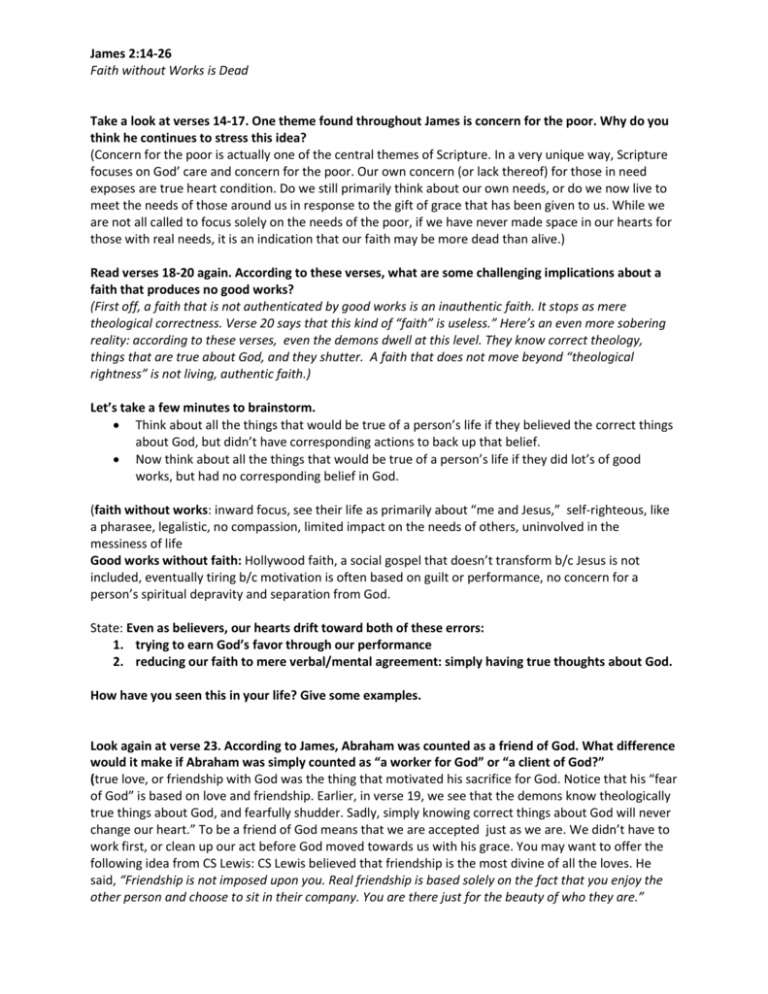James 2:14-26 Faith without Works is Dead Take a look at verses 14
advertisement

James 2:14-26 Faith without Works is Dead Take a look at verses 14-17. One theme found throughout James is concern for the poor. Why do you think he continues to stress this idea? (Concern for the poor is actually one of the central themes of Scripture. In a very unique way, Scripture focuses on God’ care and concern for the poor. Our own concern (or lack thereof) for those in need exposes are true heart condition. Do we still primarily think about our own needs, or do we now live to meet the needs of those around us in response to the gift of grace that has been given to us. While we are not all called to focus solely on the needs of the poor, if we have never made space in our hearts for those with real needs, it is an indication that our faith may be more dead than alive.) Read verses 18-20 again. According to these verses, what are some challenging implications about a faith that produces no good works? (First off, a faith that is not authenticated by good works is an inauthentic faith. It stops as mere theological correctness. Verse 20 says that this kind of “faith” is useless.” Here’s an even more sobering reality: according to these verses, even the demons dwell at this level. They know correct theology, things that are true about God, and they shutter. A faith that does not move beyond “theological rightness” is not living, authentic faith.) Let’s take a few minutes to brainstorm. Think about all the things that would be true of a person’s life if they believed the correct things about God, but didn’t have corresponding actions to back up that belief. Now think about all the things that would be true of a person’s life if they did lot’s of good works, but had no corresponding belief in God. (faith without works: inward focus, see their life as primarily about “me and Jesus,” self-righteous, like a pharasee, legalistic, no compassion, limited impact on the needs of others, uninvolved in the messiness of life Good works without faith: Hollywood faith, a social gospel that doesn’t transform b/c Jesus is not included, eventually tiring b/c motivation is often based on guilt or performance, no concern for a person’s spiritual depravity and separation from God. State: Even as believers, our hearts drift toward both of these errors: 1. trying to earn God’s favor through our performance 2. reducing our faith to mere verbal/mental agreement: simply having true thoughts about God. How have you seen this in your life? Give some examples. Look again at verse 23. According to James, Abraham was counted as a friend of God. What difference would it make if Abraham was simply counted as “a worker for God” or “a client of God?” (true love, or friendship with God was the thing that motivated his sacrifice for God. Notice that his “fear of God” is based on love and friendship. Earlier, in verse 19, we see that the demons know theologically true things about God, and fearfully shudder. Sadly, simply knowing correct things about God will never change our heart.” To be a friend of God means that we are accepted just as we are. We didn’t have to work first, or clean up our act before God moved towards us with his grace. You may want to offer the following idea from CS Lewis: CS Lewis believed that friendship is the most divine of all the loves. He said, “Friendship is not imposed upon you. Real friendship is based solely on the fact that you enjoy the other person and choose to sit in their company. You are there just for the beauty of who they are.” Action Step this week: Spend some time this week in Genesis 22, the historical narrative about Abraham and his son Isaac. Abraham authenticated his true faith by putting it into action. God called him to sacrifice the thing that was closest to his heart, his son. Abraham demonstrated faithfulness to God with a willingness do whatever God asked him to do, even if it meant giving up his most intimate treasure, his son. Abraham demonstrated true faith and love for God by his obedience to do whatever God asked him to do, even if it didn’t make complete sense at the time. According to James 2:23, we see that Abraham’s motivation for trusting God was not blind obedience, but because he loved God as a friend. Abraham provides a vivid story of faith that is driven by true love and friendship with God. Abraham sets the stage for an even greater story about a father’s love for his son. Just like Abraham loved his son, Isaac, so God the father loved his only son, Jesus. In the story of Abraham, God provides a ram to be the sacrifice instead of Isaac. Just like Abraham does not withhold his son for God, so God does not withhold his son for us. But the difference, is that God did not remove his son from the altar. In allowing his only son to be sacrificed, God demonstrates that he never withholds or spares anything from us. Jesus bore the full weight of God’s wrath upon him so that we would not have to experience it. The Father and Son experienced true loss and true separation so that those who would believe would not. Spend time thanking Jesus for the sacrifice he made for you. The natural response to this sort of sacrifice is gratitude. 1. In what ways do you show your gratitude for God? 2. Out of a spirit of sheer love and gratitude, are you able to give up your greatest treasure for God?









